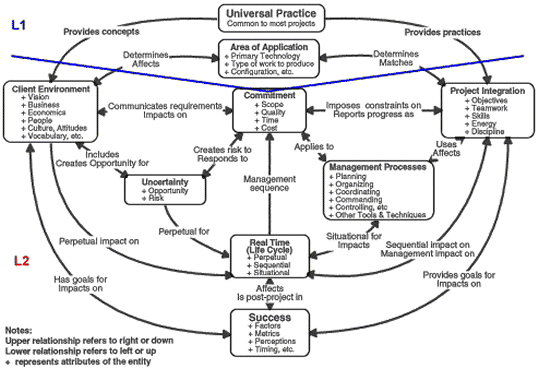The Starting Point
Following the Concept Mapping methodology described earlier, what are the most
inclusive things that we know about project management? Perhaps the most fundamental
is that a project represents a commitment between the project's management and
its client or sponsor.
In a concept mapping exercise, a concept map emerged as shown in Exhibit
2.
Note that in this exhibit, the various relationships are attached to the corresponding
linking arrows. The upper line of each relationship description represents the
relationship flowing from left to right or from the top downwards. The lower
line describes the relationship flowing in the opposite direction.
It should also be observed that the flow of all the relationships shown are
enabled by communication, and hence communication is inherent in the
total concept map.
The fundamental topics of Project Management and their relationships were described
as follows:
- Universal Practice. An overriding body of common practices has been
identified as appropriate for most projects.
- Area of Application. The dominant technology involved in the project
has a major influence on how it should be managed.
- Client Environment. This determines how projects are generated and
has a major influence on how they are structured.
- Commitment. A project represents a commitment to scope, quality,
time and cost between the project's management and its client or sponsor.
- Project Integration. A project is a short-lived arrangement of people
integrated for the purpose.
- Uncertainty. This provides both opportunity for the client and risks
to the project.
- Management Processes. These are the major project contribution and
responsibility.
- Real Time (Life Cycle). Perpetual, Sequential and Situational aspects
play a major role in successful project completion.
- Success. The ultimate objective of project management is success
in all its aspects.

Exhibit 2: Concept Map of Project Management (when viewed as a knowledge structure)
Note that commitment to scope, quality, time and cost is the dominant theme
of communication across the client/project boundary. It is worth repeating that
of all of the relationship, this commitment is perhaps the most central to successful
project management.
This project management concept map is developed as a PMKS outline in Appendices
A and B. See Appendix A for Universal Project Management
Practice, and Appendix B for Areas of Project Management
Application. These appendices include several further levels of detail.
|



